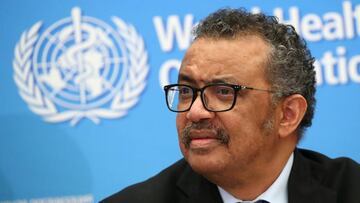The six World Health Organisation conditions to permit lockdown relaxation
Director of the WHO, Tedros Adhanom Ghebreyesus claimed that a relaxation of confinement relegations could lead to a further resurgence of the virus.

One of the current concerns affecting the World Health Organisation (WHO) is to ensure that countries control lockdown relaxation regulations in a methodical and structured manner, a point alluded to by director Tedros Adhanom Ghebreyesus in a recent press conference.
He stated that whilst relaxation measures were welcomed in the likes of Austria and Denmark, he was anxious that a hurried approach could lead to a 'deadly resurgence of the virus'.
"We know that in some countries, #COVID19 cases are doubling every 3 to 4 days.
— World Health Organization (WHO) (@WHO) April 13, 2020
However, while COVID-19 accelerates very fast, it decelerates much more slowly.
In other words, the way down is much slower than the way up"-@DrTedros #coronavirus
The organisation have outlined six key areas that could lead to nations easing confinement regulations:
Control the transmission, guarantee the condition of health workers, minimise the risk of infection in open spaces. Introduce preventative measures in offices and schools, control the possibility of 'imported cases' and ensure that members of the public are constantly informed of the danger the virus presents
Dr. Tedros emphasised the importance of the final point adding: "Each individual has a huge role to play in defeating the pandemic".
Wuhan starts to open
China sealed off Wuhan, a central city of 11 million people, on 23 January, a drastic step that came to symbolise its aggressive management of the virus. More than 50,000 people in Wuhan were infected, and more than 2,500 of them died, about 80% of all deaths in China, according to official figures.

Last week the original epicentre of the Covid-19 virus ended it's lockdown period although many restrictions and controls remain in place.
Spain on lockdown through to 26 April
In a bid to curb the spread of the coronavirus in Spain, one of the nations most affected by the pandemic, Spanish prime minister Pedro Sánchez declared a state of emergency on 14 March, ordering people in the country to stay at home as part of measures that were initially due to run until 29 March.
The Spanish government has, however, eased measures as of Monday 13 April to allow some work to start again. There have been 169,496 cases in Spain with over 17,000 deaths but the daily cases and deaths has been in decline now for a couple of days. However, in a sign that the situation was taking a turn for the better, some businesses, including construction and manufacturing, were allowed to reopen.

Sánchez secured parliament's backing for a second extension, until 27 April - and, although Spain's rate of cases and deaths has begun to show signs of slowing, he said he was "convinced" he'll also have to seek a third, which would take the stay-at-home order in place in the country into May.
Live coverage of the coronavirus crisis
Related stories
You can keep abreast of the latest developments in the coronavirus pandemic by following our daily live blog.
The complete lowdown on Covid-19
Check out our in-depth guide to the coronavirus pandemic.

